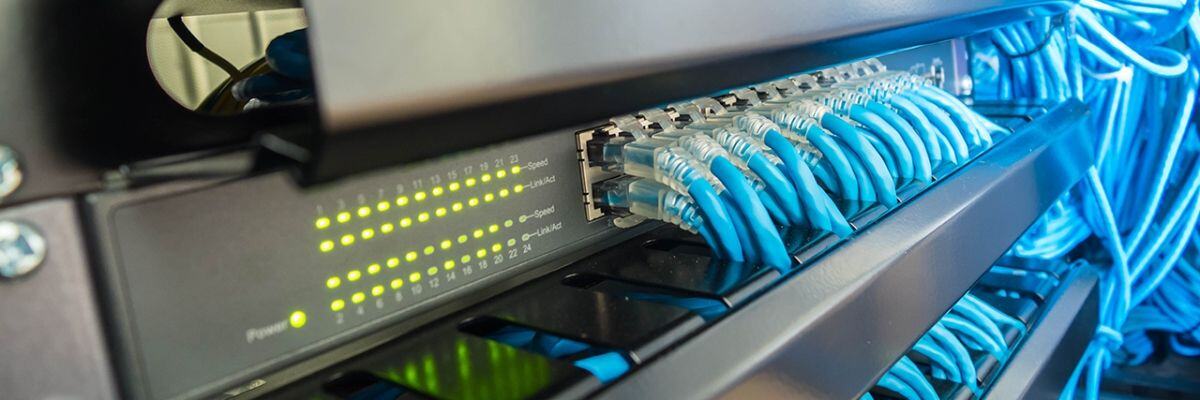Consumer-Grade VS. Business-Grade Network Equipment
July 16th, 2021 | 4 min. read

Using consumer network equipment for your business might seem like a good idea in the short term, but it can cause a lot of problems down the line. Find out the difference between consumer and business-grade equipment and why it matters.
Connectivity is essential.
Today, over 85% of Americans have access to the internet, many of whom can no longer imagine life without it. It's so ingrained in our daily lives and business processes that a network outage of an hour or more will almost always make national headlines--and for a good reason.
According to a study by Gartner, the average cost of internet downtime for US businesses is around $5,600 per minute, which's over $330,000 an hour.
While this figure may vary from one business to another, you also need to consider the hidden costs you might incur when the internet goes down. From losing suppliers or new customers to declining morale and productivity can all be very expensive, especially when you experience multiple network outages a year.
 Our businesses have become so reliant on connectivity that if your network equipment fails, it's tempting to simply ask the intern to grab a new one from the nearest Best Buy. However, believe us when we tell you--that might not be the best idea.
Our businesses have become so reliant on connectivity that if your network equipment fails, it's tempting to simply ask the intern to grab a new one from the nearest Best Buy. However, believe us when we tell you--that might not be the best idea.
We've seen the scenario stated above dozens of times throughout our years providing IT services to organizations. Our team has even witnessed several situations where a failed consumer-grade four-port switch brought down an entire network in a business environment.
Consumer-grade network equipment is simply not designed to handle the rigors required by your business. You run the risk of security breaches, equipment that's incompatible with one another, and even more network downtime in the future, which, as we said before, isn't just disruptive but also very costly.
In this article, we'll detail why opting for business-grade network equipment is a better long-term investment than its cheaper commercial counterpart. To do this, we'll need to answer the following questions:
- What's the difference between consumer-grade and business-grade network equipment?
- What are the potential risks for using commercial-grade network equipment?
- How do you choose the right network equipment?
What's the difference between consumer-grade and business-grade network equipment?
Price, functionality, and reliability are the primary differences between consumer-grade and business-grade network equipment. Let's take a look at these differences in more detail.
Price
 While consumer-grade equipment is much cheaper in comparison, business-grade equipment offers more bang for your buck both for the short-term and in the long run.
While consumer-grade equipment is much cheaper in comparison, business-grade equipment offers more bang for your buck both for the short-term and in the long run.
Functionality
 Often, consumer-grade network switches are plug-and-play devices which makes them easy to use but lack management capabilities. That means you will not be able to alter the device to meet the specific needs of your network.
Often, consumer-grade network switches are plug-and-play devices which makes them easy to use but lack management capabilities. That means you will not be able to alter the device to meet the specific needs of your network.
Reliability
 As it usually works with cheaper equipment, consumer-grade equipment tends to be less durable, making network outages more common. They are also not designed to handle the bandwidth needs of most businesses, which could lead to problems when you have people on your team.
As it usually works with cheaper equipment, consumer-grade equipment tends to be less durable, making network outages more common. They are also not designed to handle the bandwidth needs of most businesses, which could lead to problems when you have people on your team.
What are the risks of using consumer-grade network equipment?

Ultimately, what this all boils down to is reliability. Your business needs a reliable connection to function smoothly and continuously. That is why it is essential to have the right equipment or face the potential risks; these can include:
Poor support and warranty
 Consumer-grade network switches and equipment often provide little to no after-sales support and short warranties. That helps keep their price down but may cause bigger problems and more costs for you in the future.
Consumer-grade network switches and equipment often provide little to no after-sales support and short warranties. That helps keep their price down but may cause bigger problems and more costs for you in the future.
Not built to last
 Network equipment made for consumers isn't built to stand the test of time. That's because the average homeowner isn't thinking about how their network equipment will perform in the next five years or more. Consumer-grade equipment is designed to be easily replaceable. That might not be an issue when you're using it at home, but it becomes a serious problem when you're relying on it to fulfill the demands of your business day in and day out.
Network equipment made for consumers isn't built to stand the test of time. That's because the average homeowner isn't thinking about how their network equipment will perform in the next five years or more. Consumer-grade equipment is designed to be easily replaceable. That might not be an issue when you're using it at home, but it becomes a serious problem when you're relying on it to fulfill the demands of your business day in and day out.
Limited security capabilities
 No matter the industry you are in, data security should be one of your top priorities. Consumer-grade equipment often doesn't have adequate security features; they also lack management capabilities, which can leave your organization open to cyber attacks.
No matter the industry you are in, data security should be one of your top priorities. Consumer-grade equipment often doesn't have adequate security features; they also lack management capabilities, which can leave your organization open to cyber attacks.
Compatibility issues
 Getting your equipment from different consumer brands and providers also means some of them might not be compatible with the systems you are currently using. Mismatched or incompatible network equipment can often cause unforeseeable issues. It can prevent you from accessing your resources and limit your actions within your network. There have also been many cases where incompatible equipment has caused major connectivity problems.
Getting your equipment from different consumer brands and providers also means some of them might not be compatible with the systems you are currently using. Mismatched or incompatible network equipment can often cause unforeseeable issues. It can prevent you from accessing your resources and limit your actions within your network. There have also been many cases where incompatible equipment has caused major connectivity problems.
How do you choose the right network equipment?
Now that you know why opting for business-grade equipment is essential for your organization, let's look at some tips for choosing the right ones.
Determine if you need to make the purchase
You don't always need to upgrade to the latest system. Business-grade network equipment often has lengthy warranties, and advances in the technology usually have to do with the speed of the network ports.
So if your current equipment is still in good order and capable of fulfilling your business needs, you may forego the upgrade. However, if your business needs a performance increase, or you need a feature that is not provided by your current equipment, then an upgrade would be a sound investment.
Source equipment from reputable manufacturers
Choose brands and manufacturers that have a proven track record of providing quality products and services. These companies often offer the best warranties and after-sales support for their products.
Review the warranty and service agreement
Always make sure to read through the warranty and service agreement to prevent issues down the line. Business-grade equipment should have a lengthy warranty and a support service you can contact 24/7.
Plan ahead
Keep the goals of your organization in mind before making a purchase. Try to answer these questions about your organization.
- Are you planning on growing your network within a certain time period?
- How many ports will you need in the near future?
- Do you have plans to upgrade your systems soon?
Planning for your company's future growth is always a good idea especially considering business-grade equipment tends to be more expensive. Maximizing your investment by incorporating your plans will help you save time and money in the long term.
Do your research
As with any purchase, you should always make sure to do your research before making a decision. Read reviews from business owners like yourself or ask IT experts for advice.
While you might think opting for consumer-grade network equipment helps your business save time and money, it might actually cost you a lot more in the long run. So if you're ever in a position where you need to choose for your business, opt for equipment that you can rely on for years to come.
Still, need help choosing the right network equipment for your business needs? Please fill out this form for a free tech consultation with our IT professionals.
Mark Sheldon Villanueva has over a decade of experience creating engaging content for companies based in Asia, Australia and North America. He has produced all manner of creative content for small local businesses and large multinational corporations that span a wide variety of industries. Mark also used to work as a content team leader for an award-winning digital marketing agency based in Singapore.
Topics:
